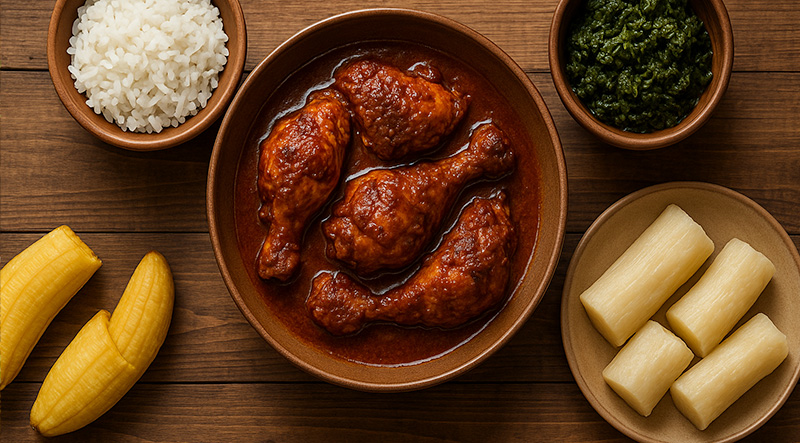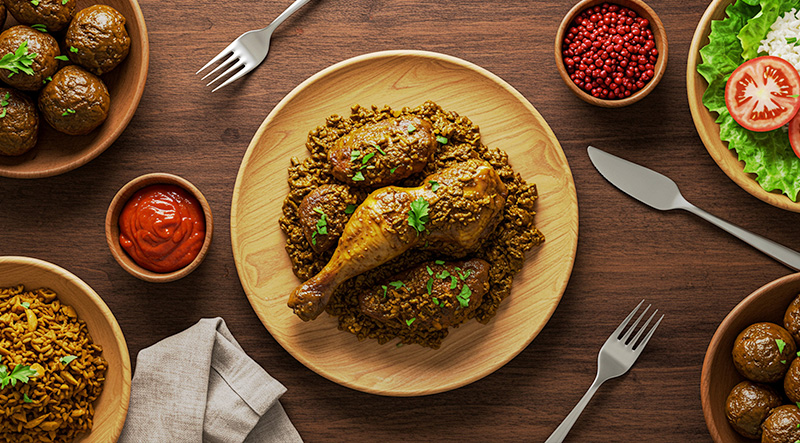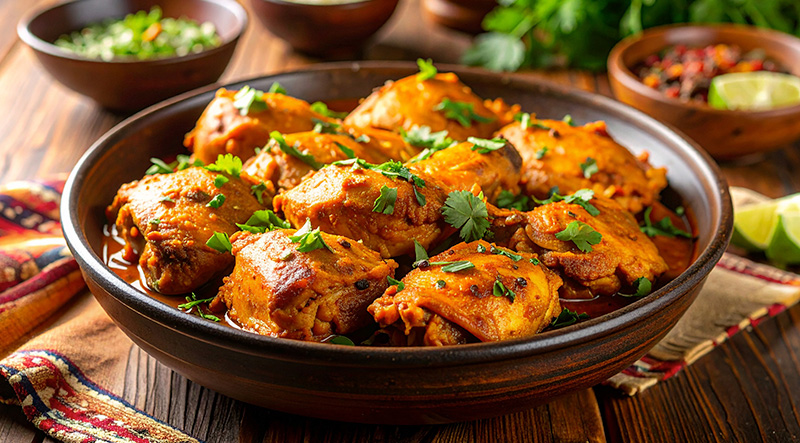Bold, earthy, and irresistibly rich, Nyembwe Chicken is the heart and soul of Gabonese cuisine. This national dish features tender chicken simmered in a luscious sauce made from palm nut pulp, known locally as nyembwe, which gives it a deep red color and a uniquely nutty, savory flavor. Infused with onions, garlic, and local spices, the stew is typically served with cassava, plantains, or rice, creating a satisfying meal that celebrates both tradition and taste. Whether served at family feasts or festive gatherings, Nyembwe Chicken delivers a true taste of Gabon with every bite. Read More...
The History of Nyembwe Chicken – A Taste of Gabon’s Heartland:
Among the rich culinary traditions of Central Africa, Nyembwe Chicken stands out as Gabon’s national dish, celebrated for its deep flavor and cultural significance. Known locally as Poulet Nyembwe, this dish is a savory chicken stew prepared with a thick sauce made from palm nut pulp—a staple ingredient in many West and Central African cuisines. Nyembwe Chicken is more than just a flavorful meal; it is a symbol of Gabonese identity, heritage, and the communal spirit of its people.
Palm Nuts: The Soul of the Dish:
At the heart of Nyembwe Chicken lies the nyembwe, the name for palm nut pulp in the Fang language, one of the major ethnic groups in Gabon. The sauce is made by boiling the red palm fruits, pounding them to extract the pulp, and then simmering it into a rich, oily base. This method is both labor-intensive and traditional, passed down through generations as a way to make use of the abundant oil palms growing wild and cultivated across the region.
The palm nut sauce contributes not only color and depth to the dish but also historical value—palm oil has long been a vital part of Gabonese culture, used in cooking, healing, and rituals. The high-fat content of the pulp gives the sauce a luxurious texture and nutty aroma that pairs beautifully with stewed meats, especially chicken.
From Village to National Table:
Nyembwe Chicken likely originated in village cooking, where stews were made from whatever ingredients were available locally—most commonly poultry, bushmeat, or smoked fish—combined with staples like cassava, plantains, and wild greens. As urbanization grew and national identity developed, Nyembwe Chicken gained popularity across ethnic lines, becoming a dish shared by Gabonese people of all backgrounds during holidays, weddings, and other special gatherings.
Its national recognition was cemented in part due to its symbolic representation of unity—a dish that links rural traditions with modern tastes, and one that showcases both the natural bounty and culinary artistry of Gabon.
Evolving Traditions:
While the traditional preparation involves manually extracting pulp from palm nuts, modern adaptations may use canned palm nut concentrate to save time. Some cooks also enhance the stew with smoked fish or hot pepper for added complexity. Yet despite these modern touches, the dish remains largely unchanged in spirit: slow-cooked, hearty, and made with love.
It is typically served with fufu (mashed cassava or plantain), boiled rice, or cooked yams, forming a balanced and satisfying meal that highlights the diversity of Gabon’s agricultural produce.
A Dish That Connects Past and Present:
Today, Nyembwe Chicken is recognized not only as a culinary highlight of Gabon but as a representative of the wider Central African food culture. It’s a dish that tells the story of the land—of palm trees and traditional cooking pots, of shared meals and cultural pride.
As Gabon continues to embrace both its traditions and its place in the global culinary scene, Nyembwe Chicken remains a flavorful reminder of its roots: earthy, rich, and proudly Gabonese.
Par-boil the palm nuts (if using fresh):
Brown the chicken:

Build the flavor base:
Combine and simmer:

Slow-cook:
Taste & finish:

Serve Gabon-style:
Enjoy the deep flavors of Gabon’s national treasure!
The total preparation and cooking time for Nyembwe Chicken is approximately 1 hour and 30 minutes. Preparing the ingredients—cutting the chicken, chopping vegetables, and (if using fresh palm nuts) extracting the pulp—takes about 20–30 minutes, while cooking the stew itself takes 45–60 minutes to allow the flavors to develop and the sauce to thicken. If using canned palm-nut concentrate, prep time is reduced significantly. Most of the cooking is hands-off, allowing the chicken to simmer gently in the palm-rich sauce until tender and infused with flavor.
A single serving of Nyembwe Chicken, based on the recipe provided, contains approximately 500–650 calories. The chicken (with skin and bone) contributes around 250–300 calories per portion, while the rich palm-nut pulp or concentrate adds another 200–250 calories due to its high content of natural oils and fats. Additional calories come from the sautéed onions, tomatoes, and cooking oil used for browning. If optional ingredients like smoked fish or rice are added, the total can increase by 100–150 calories. Despite its richness, Nyembwe Chicken remains a nutrient-dense and satisfying dish rooted in tradition.







